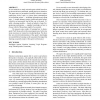Free Online Productivity Tools
i2Speak
i2Symbol
i2OCR
iTex2Img
iWeb2Print
iWeb2Shot
i2Type
iPdf2Split
iPdf2Merge
i2Bopomofo
i2Arabic
i2Style
i2Image
i2PDF
iLatex2Rtf
Sci2ools
115
click to vote
ICMLA
2007
2007
Learning to evaluate conditional partial plans
In our research we study rational agents which learn how to choose the best conditional, partial plan in any situation. The agent uses an incomplete symbolic inference engine, employing Active Logic, to reason about consequences of performing actions — including information-providing ones. A simple planner creates conditional partial plans, which do not necessarily lead all the way to the goal. Finally, a learning module — based on Inductive Logic Programming mechanisms — supplies knowledge on how to choose which of those plans ought to be executed. We present some results of learning how to distinguish “bad” plans early in the reasoning process, before too many resources are wasted on considering them. We show that non-trivial transformations of the agent’s knowledge are needed before learning can be successful, but argue that learning can greatly improve the agent’s performance. KEY WORDS Intelligent Agents, Machine Learning, Logic Programming, Planning under Uncertain...
Related Content
| Added | 29 Oct 2010 |
| Updated | 29 Oct 2010 |
| Type | Conference |
| Year | 2007 |
| Where | ICMLA |
| Authors | Slawomir Nowaczyk, Jacek Malec |
Comments (0)

